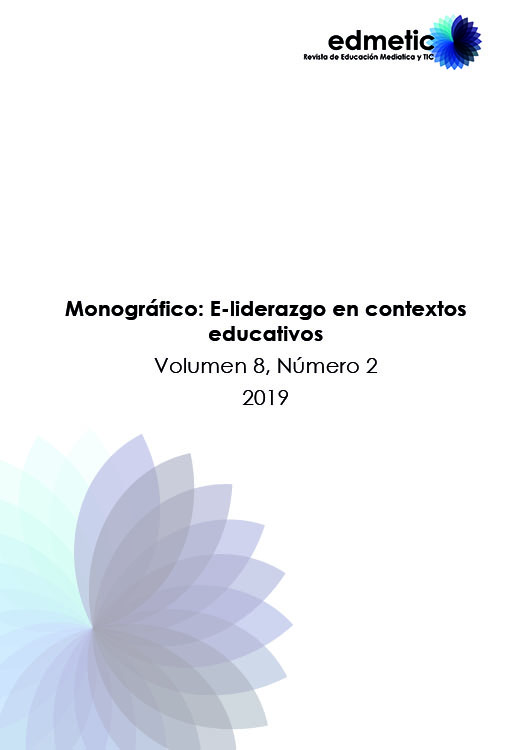La gestión de un centro de Educación Secundaria. Un estudio cualitativo con directores en Cantabria
Main Article Content
Abstract
Downloads
Article Details
TRANSFER RIGHTS AND COMMITMENTS TO EDMETIC, REVISTA DE EDUCACIÓN MEDIÁTICA Y TIC
E-ISSN: 2254-0059
The undersigned author(s) of article entitled:
- Transfer to EDMETIC, Revista de Educación Mediática y TIC publishing rights of the article mention before. The magazine will have the right to publish in any format or media this article.
- The author(s) claim that this article is original and which has not been published before in any format and wasn´t submitted for evaluation to another publication.
- The author(s) claim that this article has the copyright´s permissions for publication
- The author(s) accept the changes to the contents on the review, and changes in the style of the manuscript by the Editorial Board of EDMETIC, Revista Educación Mediática y TIC.
- The author(s) declare that they have complied with the ethical principles of research.
- The author(s) not be subject to personal or business association that involves a conflict of interest with article presented
- El author(s) undertakes to give the primary sources of information, if requested.
Date:
Author(s) names and signatures (1):
(1) Fill the form and send to: revistaedmetic@uco.es
References
Abari, A. O., Mohammed, M. O. B. & Oyetola, I. O. (2012). Organizational identity and effectiveness of public and private senior secondary schools in south west Nigeria. Problems of Education in the 21st Century, 40, 7-16.
Álvarez, C. (2018). How can pre-service training be improved in Spain? The voices of secondary school headteachers in the Cantabria region. Leadership and Policy in Schools, https://doi.org/ 10.1080/15700763.2018.1532014
Álvarez, C. & Fernández, E. (2017). La selección de directores de centros educativos tras la LOMCE. Revista de Educación de la Universidad de Granada, 24, 137- 183.
Álvarez, C. & Fernández, E. (2018). El director profesional en España: formación, selección y evaluación. En J. Teixidó Saballs & N. Camacho Oña (Eds) (2018). Projecte de direccio i millora escolar. Barcelona: Malhivern.
Bayrak, C., Altinkurt, Y. & Yilmaz, K. (2014). The Relationship between School Principals' Power Sources and School Climate. Anthropologist, 17 (1), 81-91.
Coldron, J., Cripps, C. & Shipton, L. (2010). Why are English secondary schools socially segregated? Journal of Education Policy, 25 (1), 19-35.
Epstein, J. L., Galindo, C. L. & Sheldon, S. B. (2011). Levels of Leadership: Effects of District and School Leaders on the Quality of School Programs of Family and Community Involvement. Educational Administration Quarterly, 73 (3), 462-495.
Higgins, M., Ishimaru, A., Holcombe, R. & Fowler, A. (2012). Examining organizational learning in schools: The role of psychological safety, experimentation, and leadership that reinforces learning. Journal of Educational Change, 13 (1), 67-94.
LOMCE (2013). Ley Orgánica 8/2013, de 9 de diciembre, para la mejora de la calidad educativa. Boletín Oficial del Estado de 10 de diciembre de 2013.
Madsen, W. & O'Mullan, C., Keen-Dyer, H. (2014). Learning and leadership: Evaluation of an Australian rural leadership program. Australian Journal of Adult Learning, 54 (1), 30-49.
McCollum, E. C. & Yoder, N. P. (2011). School Culture, Teacher Regard, and Academic Aspirations among Middle School Students. Middle Grades Research Journal, 6 (2), 65-74.
Price, H. E. (2012). Principal-Teacher Interactions: How Affective Relationships Shape Principal and Teacher Attitudes. Educational Administration Quarterly, 48 (1), 39-85.
Rigby, J. G. (2013). Three Logics of Instructional Leadership. Educational Administration Quarterly, 50 (4), 610-644.
Rutkowski, D. (2014). The OECD and the local: PISA-based Test for Schools in the USA. Discourse: Studies in the Cultural Politics of Education.
Schildkamp, K., Vanhoof, J., van Petegem, P. & Visscher, A. (2012). The use of school self-evaluation results in the Netherlands and Flanders. British Educational Research Journal, 38 (1), 125-152.
Smith, R. & O'Leary, M. (2013). New Public Management in an age of austerity: knowledge and experience in further education. Journal of Educational Administration and History, 45 (3), 244-266.
Van Voorhis, F. & Sheldon, S. (2004). Principals’ roles in the development of US programs of school, family, and community partnerships. International Journal of Educational Research, 41 (1), 55-70.
Vázquez, S., Liesa, M. & Bernal, J.L. (2016). El camino hacia la profesionalización de la función directiva: el perfil competencial y la formación del director de centros educativos en España. Perfiles Educativos, 36 (151), 158-174.
Verger, A. & Curran, M. (2014). New public management as a global education policy: its adoption and re-contextualization in a Southern European setting. Critical Studies in Education, 55 (3), 253-271.
